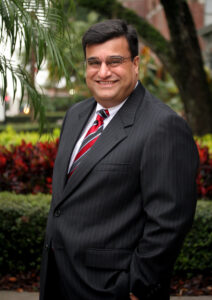Writer: Max Crampton-Thomas
 2 min read March 2021 — The Sykes College of Business draws together talented faculty, sophisticated technology and a cutting-edge curriculum to provide students with the tools to succeed in a changing world. Dean Frank Ghannadian spoke with Invest: about the challenges of the past year and the school’s approach to overcome them.
2 min read March 2021 — The Sykes College of Business draws together talented faculty, sophisticated technology and a cutting-edge curriculum to provide students with the tools to succeed in a changing world. Dean Frank Ghannadian spoke with Invest: about the challenges of the past year and the school’s approach to overcome them.
What have been some highlights for the College of Business despite the challenges presented in 2020?
Last March, we were thinking initially of extending spring break by a week or two. But we went beyond that to do the final third of the semester virtually. The faculty had the technology and ability to adapt quickly and be able to deliver quality classes to students’ homes. At the end of the spring, we were able to finish up the courses and our students graduated. We then decided our summer term would be completely virtual. Our enrollments exceeded previous summers. In the fall semester, we decided we wanted students to return to campus and we followed CDC guidelines as closely as possible with the class rotation. We adopted a hybrid model where students were physically distanced and wearing masks, with a rotation for students to go to class on some days and follow the class on Zoom on others. Our fall enrollments were relatively stable. The students’ learning has not stopped and we’ve discovered they prefer to be physically present in class. We also attracted a lot of guest speakers since they did not have to travel to the campus.
What are your expectations for the future of digital learning?
I think there will mostly be a return to the classroom. We have a new Master of Science in Business Analytics that is completely online and this can be taken on demand. Virtual classes stick to the in-person timetable but students can plug in remotely. I think going forward we’ll see around two-thirds of learning taking place face to face, with the remainder broken up between online and virtual. Some of these courses lend themselves to staying in this format because it can be more efficient in some cases than others. We like to have the students work in groups and the technology enables this.
What are your projections for the economic recovery?
I agree with the reports from the economics department, which say recovery should be visible by the end of 2021. The government is injecting so much money into the economy and even though there is not as much spending in stores, consumer spending online has not eased. The stimulus will fill in the holes. Sector-wise, it’s a different story. In the hotel or entertainment sectors, there will be a massive disadvantage before a comprehensive vaccine program has been rolled out. There will be a shift in income in different sectors but overall, the economy should bounce back to pre-COVID levels by the end of the year.
How does the college contribute to the economy of Tampa Bay?
We have several outreach centers at the college. We have the TECO Energy Center for Leadership, which focuses on making sure our graduate students receive the leadership material they need for their careers. We also have the Entrepreneurship Center, which is a 30,000-square-foot-plus facility with incubators and accelerators. We also have the Naimoli Institute, which connects with over 300 businesses. Every student graduate at the College of Business needs to work with a real company before they graduate. Groups of graduates go to companies and solve some of the problems they are facing. That is something we do that no other business school we know of does.
Do you foresee any change in regulations with the Biden administration?
Regardless of who is in power, I don’t foresee any regulations changing drastically. After 2025, we will have a reduction in 18–22-year-olds around the country, which will affect the whole of the education sector. I think we need to get ready for that coming up in the next five to 10 years. Some institutions will not survive as a result. I think unless we can attract more foreign students, that will hurt us as institutions.
What is your outlook and what are your priorities for the sector in 2021?
About four and a half years ago, we launched a major in cybersecurity and around 10% of our College of Business students are in this program. The new technology building in Tampa will house laboratories for new cybersecurity, information systems and computer science companies. The future of business will be tied to cybersecurity. We’ll make a leap into more and more sophisticated technology so MBA programs will have more technology associated with them. Students graduating from school will be expected to have more capabilities.
The university recently made a $600 million investment in new centers for learning, and technological innovations that also include cybersecurity. We have cybersecurity labs that are playgrounds for students to practice defending against cybercrimes. Those need to be separated from the computer system of the university just because of the sensitive content and the risk to the university systems. A new technology building is under construction and is scheduled to open next year.
For more information, visit:
